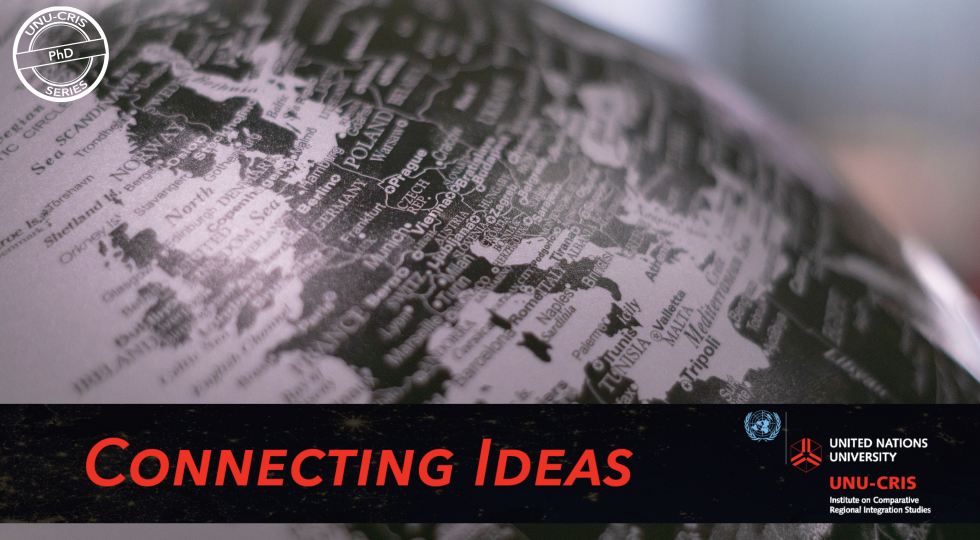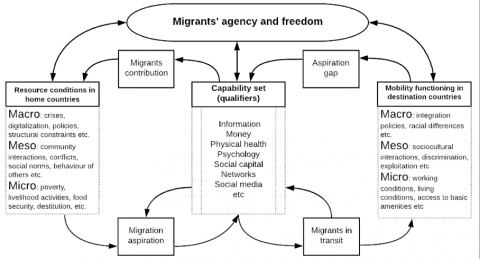The Socioeconomics of International Migration Decisions and Outcomes: Insights from the Nigeria-Italy Migration Corridor


Chinedu Obi
Postdoctoral Research Fellow
Universita di Pisa, Italy
This blog is a part of the UNU-CRIS PhD Series featuring key findings from the dissertations of regionalism researchers across the world. The PhD Series aims to showcase new, original research in the areas of regional cooperation, regional integration, and regional governance.
15 September 2021 | #21.20 | The views expressed in this post are those of the author and may not reflect those of UNU-CRIS.
The number of international migrants has been rising since the last decade. However, a predominant number of people are non-migrants. The increasing migration flows, nevertheless, have attracted the interest of the research community. Currently, there is vast literature on the trend, drivers, and developmental impacts of international migration. In my dissertation, I argue that there is also a need to study why some people migrate, and others do not migrate and why some migrants contribute to their households' welfare while others do not. These additional questions can be addressed by researching the socioeconomics of migration decisions and outcomes of a specific group of people before and after migration. The neoclassical migration theories upon which previous research is based may be inadequate to undertake this comprehensive investigation.
The dissertation started by critically reviewing the neoclassical migration theories and conceptualises the aspiration-capability framework as a prospect in migration theory. It explains that most of the neoclassical migration theories were made in the 20th century. They, therefore, require an update to accommodate new issues in contemporary migration dynamics. It went further to highlight six general shortcomings of these theories. These shortcomings include that they perceive migration decisions as linearly associated with hardships without considering the role of individual capabilities in migration decisions. Besides, they are too deterministic, economically centered, and origin biased. They neglect why immobility occurs and often do not consider the human agency and rights of migrants in their discussions. I, therefore, argue that a multifaceted and multidimensional capability-based approach that centralises human agency and capabilities can address these shortcomings. Hence, I adopted the capability-based migration framework as the main framework in my dissertation.

The Capability-Based Migration Framework
Image credit: Author
There are four elements of the capability-based migration framework. These elements are the factors to consider when investigating the socioeconomic issues affecting the decisions and outcomes of any given migration corridor. They include a) Resources and conditions in origin countries that drive migration. These factors operate at the macro-, meso- and micro-level in the countries of origin and inform a person that migration is preferable to staying in the country. E.g., crises, political conditions, social norms, poverty, unemployment, and lack of opportunities for life that cause hardships and social inequalities. b) The capabilities to act: The capabilities considered here include finance, physical health conditions, access to social capital, network and social media, psychological conditions, and information that enables one to migrate or achieve migration desires. c) Migrants' agency and freedom to act: Human agency, e.g., gender, age, risk attitude, personality traits, and the freedom to position themselves in a given environment at a given time could influence how existing conditions affect the migrants and how the migrants utilize their migration capabilities. d) The mobility functionings in the transit and destination countries: Functionings are the ultimate achievement of the migrants, conceptualised as the "beings and doings" of the migrants
I applied this capability-based migration framework to explain factors influencing migration decisions. I added insights into how the capabilities one owns, such as information capabilities, and freedom of choice, can qualify who can migrate and who cannot afford to migrate when exposed to the same levels of hardships. Using exploratory data from Nigeria, I showed that people making migration decisions could be classified under four main groups using their capabilities and mobility choices. These groups include the voluntary mobility group who have adequate capabilities and chooses to migrate; the constraint mobility group who have low capabilities but chooses to migrate anyway; the voluntary immobility who have high capabilities but do not desire to migrate; and the acquiescent immobility group who have low capabilities and low desire to migrate.
In the dissertation, I further explored how the possession of insufficient capabilities may lead to wrong migration decisions. I found that those who migrate irregularly fall within the constraint mobility group. They possess insufficient capabilities to access accurate information but have high migration aspirations. They, therefore, make use of social media and networks, including traffickers and smugglers, to achieve their migration desires. However, irregular migrants face several capabilities deprivations in host countries. These deprivations influence how they contribute to their households' well-being, which is among the top reasons for migration. Hence, it becomes crucial that they fully understand the journey risk becoming embarking on such a risky and futile journey. In this regard, I demonstrated how adequately planned information campaigns could enhance access to accurate migration information, improve risk perception and change intention to migrate irregularly. However, the design of the campaign is critical.

Image credit: Owula kpakpo, CC BY-SA 4.0, via Wikimedia Commons
I also applied the capability-based migration framework to explain the possible outcomes of a successful migration. Here I showed the contributions of international migrants to rural development in developing countries and how international migrants, through their remittances, improve the food security of their households during crises. I concluded that successful migrants play a significant role in capability improvement in their communities. They smoothen consumption for their immediate household and enable their households and communities to achieve higher food security equilibrium during food crises.
Generally, the dissertation is unique and timely. It brings knowledge on the complete migration trajectory of a particular group, looking at the decision stage, the movement, the arrival, and the contribution. These holistic analyses of migration dynamics have lacked in migration literature. The thesis also provides a relevant methodological contribution since, at the moment, there is not yet a well-established methodology to describe a holistic migration experience for a group of migrants or procedure for data collection of such cases. The critical contribution of this dissertation in migration literature is recognising that migrants have human agency and capabilities. I argue that migrants should not be seen as economic tools but as human beings who desire to contribute to their family's well-being. Hence, they need to be accorded fundamental human rights, empathy, and protection. Several recommendations and opportunities for future research are presented in the dissertation.
For a deeper analysis, please visit the thesis monograph.
